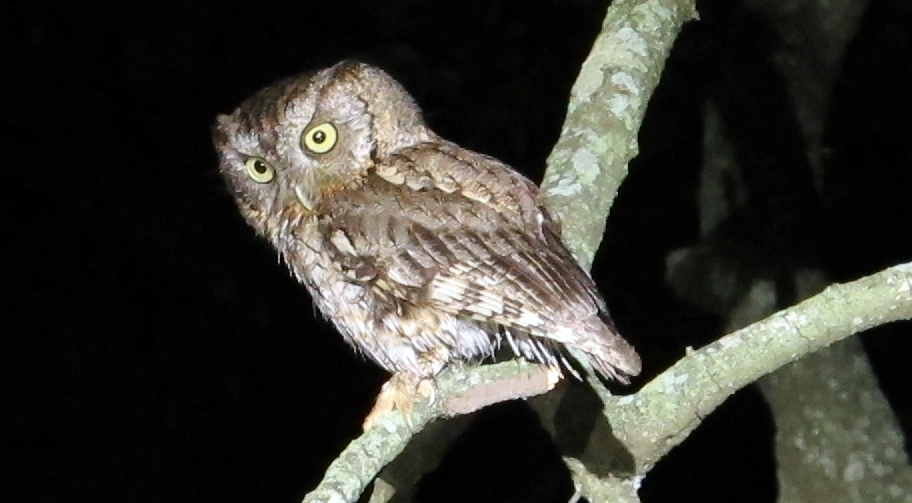by Eric Duran, Head Naturalist
eduran@naturediscoverycenter.org
Twice a year, the Nature Discovery Center has a BioBlitz, one in the Spring, and one in the Fall.
A bioblitz is a chance for an organization to count as many species of living things as they possibly can in a given area.
This helps us keep an eye on how populations of plants, fungi, animals, and slime molds are doing in our park (Russ Pitman Park) from year to year, as well as how living things may be faring in the Houston area. We’ll be able to understand long term trends as the years go on, and we continue to do them, as well.
A bioblitz is also a chance for our staff to better understand what’s living here in the park, and keep a detailed list of everything that may be living here (and is observable). For our naturalists and staff, its also a lot of fun!
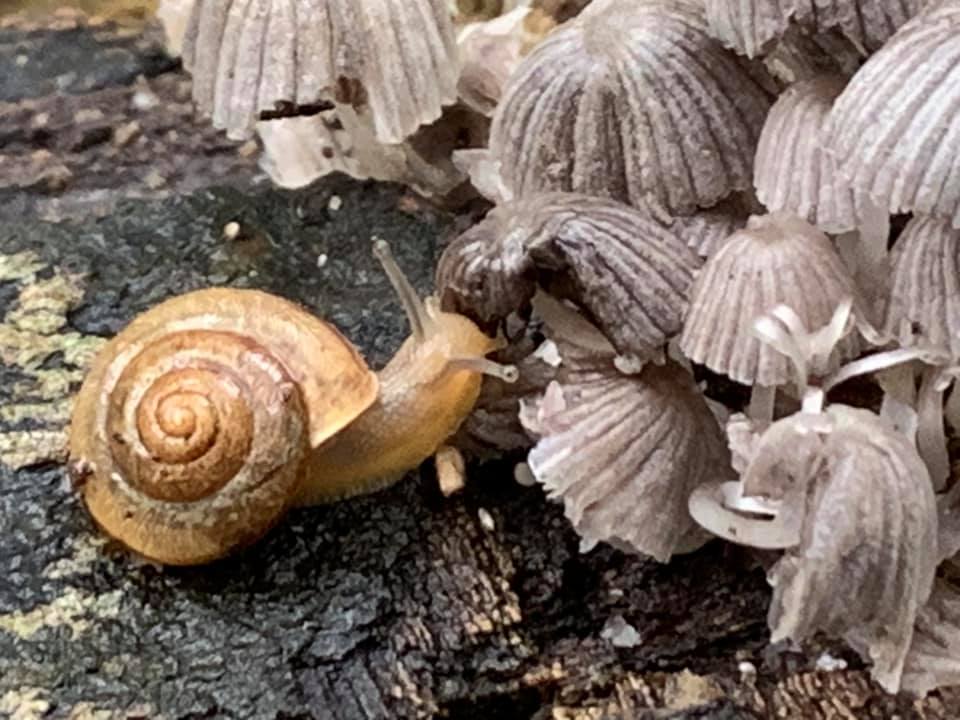
This year’s Fall 2020 BioBlitz, just ended, and we’re happy to report the count here.
The final list is compiled, and the numbers are counted. This year we set the dates to 10/9 – 10/26, giving us a little over 2 weeks, because we had very little help with observations this year (Covid-19 being the reason).
I did most of the species observations this year, but we got help from retired Senior Naturalist Mary Ann Beauchemin, Mary Spolyar from the Native Plant Society and the Gulf Coast Master Naturalists, Office Manager Pam Dunker, naturalist and teacher Debbie Lancaster, and our community of resident birdwatchers.
This year, we counted 340 species over all, which broke down like this…
ANIMALS: (139 species)
VERTEBRATES: (50 species)
INVERTEBRATES: (89 species)
FUNGI: (36 species)
SLIME MOLDS: (1 species)
PLANTS: (164 species)
There’s nothing new and exciting to report this year, but we had a very good bird list for a Fall Bioblitz, and we identified a few small insects that hadn’t been listed in the park before. We ended up having a good insect and invertebrate count, because of the warm weather. Overall, we were up from last year’s Fall Bioblitz (our first Fall Bioblitz, as a matter of fact). We had several people helping us last year, but we actually got a higher number of species! (Last year we only had 281 species.)
Let’s hope that covid is more under control for the Spring Bioblitz 2021, which will be sometime in mid-late April.
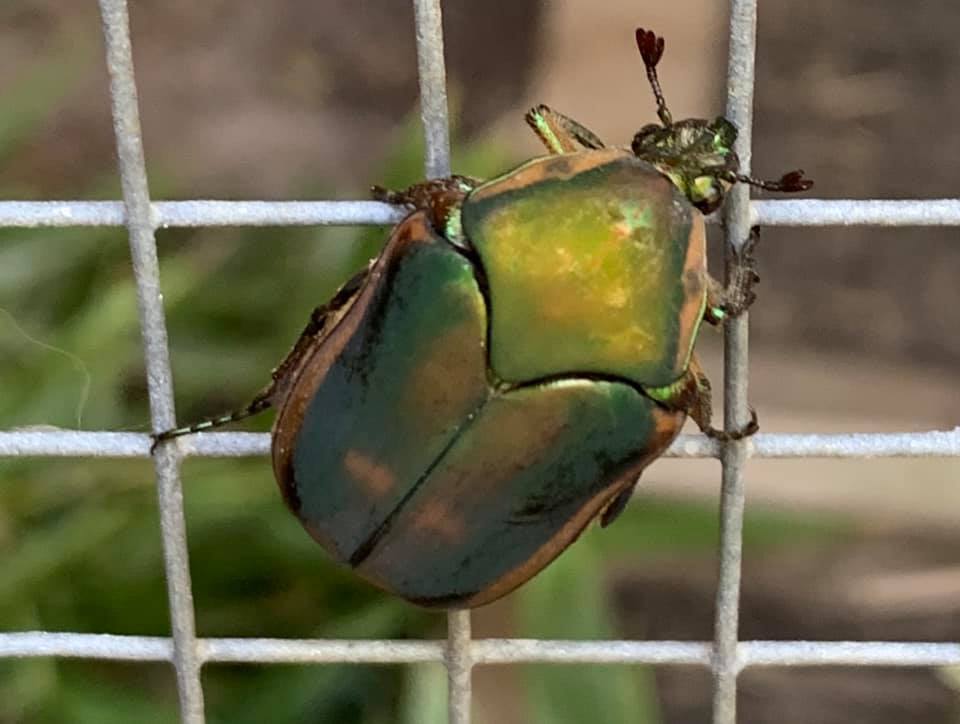
If you have any questions about the list, or our BioBlitzes, please contact me, Head Naturalist, Eric Duran at eduran@naturediscoverycenter.org.
Okay, so, here’s the list:
RUSS PITMAN PARK FALL 2020 BIOBLITZ (10/9 – 10/26)
ALL SPECIES: (340)
ANIMALS: (139)
VERTEBRATES: (50)
INVERTEBRATES: (89)
FUNGI: (36)
SLIME MOLDS: (1)
PLANTS: (164)
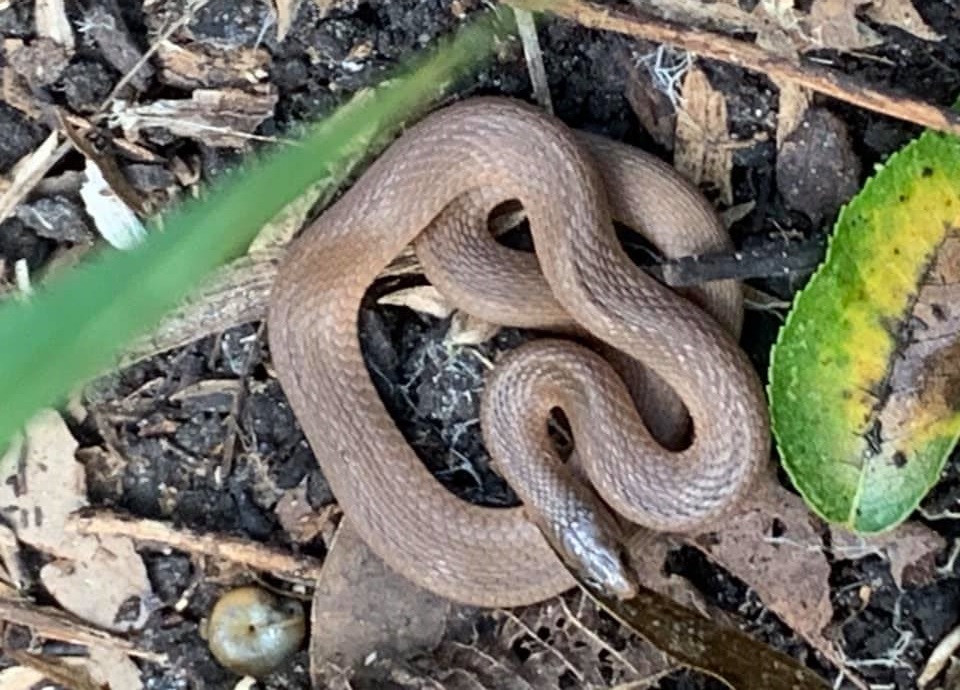
ANIMALS: 139 Species
Mammals: (3)
Gray Squirrel – Sciurus carolinensis
Fox Squirrel – Sciurus niger
Black Rat – Rattus rattus
Birds: (38)
Downy Woodpecker – Picoides pubescens
Cooper’s Hawk – Accipiter cooperii
Chimney Swift – Chaetura pelagica
Northern Cardinal – Cardinalis cardinalis
Blue Jay – Cyanocitta cristata
Red-bellied Woodpecker – Melanerpes carolinus
Eastern Screech Owl – Megascops asio
White-winged Dove – Zenaida asiatica
Carolina Chickadee – Poecile carolinensis
American Robin – Turdus migratorius
Ovenbird – Seiurus aurocapilla
Black-bellied Whistling Duck – Dendrocygna autumnalis
Carolina Wren – Thryothorus ludovicianus
American Crow – Corvus brachyrhynchos
Great Horned Owl – Bubo virginianus
Red-shouldered Hawk – Buteo lineatus
Ruby-throated Hummingbird – Archilochus colibris
American Redstart – Setophaga ruticilla
Gray Catbird – Dumetella carolinensis
Empid flycatcher – family Empidae
Northern Mockingbird – Mimus polyglottus
Eastern Wood-Peewee – Contopus virens
House Finch – Haemorhous mexicanus
Red-tailed Hawk – Buteo jamaicensis
Nashville Warbler – Leiothlypis ruficapilla
Blue-gray Gnatcatcher – Polioptila caerulea
White-eyed Vireo – Vireo griseus
Yellow-bellied Sapsucker – Sphyrapicus varius
Magnolia Warbler – Setophaga magnolia
Swainson’s Thrush – Catharus ustulatus
Black & White Warbler – Mniotilta varia
Wood Thrush – Hylocichla mustelina
Philadelphia Vireo – Vireo philadelphicus
Blue-headed Vireo – Vireo solitarius
Summer Tanager – Piranga rubra
Yellow-rumped Warbler – Setophaga coronata
Black-throated Green Warbler – Setophaga virens
Black Vulture – Coragyps atratus
Reptiles: (6)
Three-toed Box Turtle – Terrapene Carolina
Red-eared Slider – Trachemys scripta elegans
Green Anole – Anolis carolinensis
Cuban Brown Anole – Anolis sagrei
Ground Skink – Scincella lateralis
Rough Earth Snake – Haldea striulata
Amphibians: (2)
Gulf Coast Toad – Incilius nebulifer
Rio Grande Chirping Frog – Eleutherodactylus cystignathoides
Bony Fish: (1)
Mosquitofish – Gambusia affinis
INVERTEBRATES (Non-insects): (17)
Mollusks: (3)
Asian Tramp Snail – Bradybaena similaris
Globular Drop – Oligyra orbiculata
Dome Snail – Ventridens sp.
Segmented Worms: (1)
Common Earthworm – Lumbricus terrestris
Flatworms: (1)
Chinese Hammerhead Planarian – Bipalium kewense
Arachnids: (8)
Wolf Spider – family Lycosidae
House Orbweaver – Metazygia sp.
Spinybacked Orbweaver – Gasteracantha cancriformis
Bifurcate Trashline Orbweaver – Allocyclosa bifurca
Tangleweb Spider – Theridion sp.
South American Hacklemesh Spider – Metaltella simony
Twin-flagged Jumping Spider – Anasaitis canosa
American House Spider – Parasteatoda tepidariorum
Crustaceans: (4)
Comm. Striped Woodlouse – Philoscia muscorum
Lawn Shrimp (Amphipod/hopper) – Talitridae
Common Pillbug – Armadillidium vulgare
Powder Blue Isopod – Porcellionides pruinosis
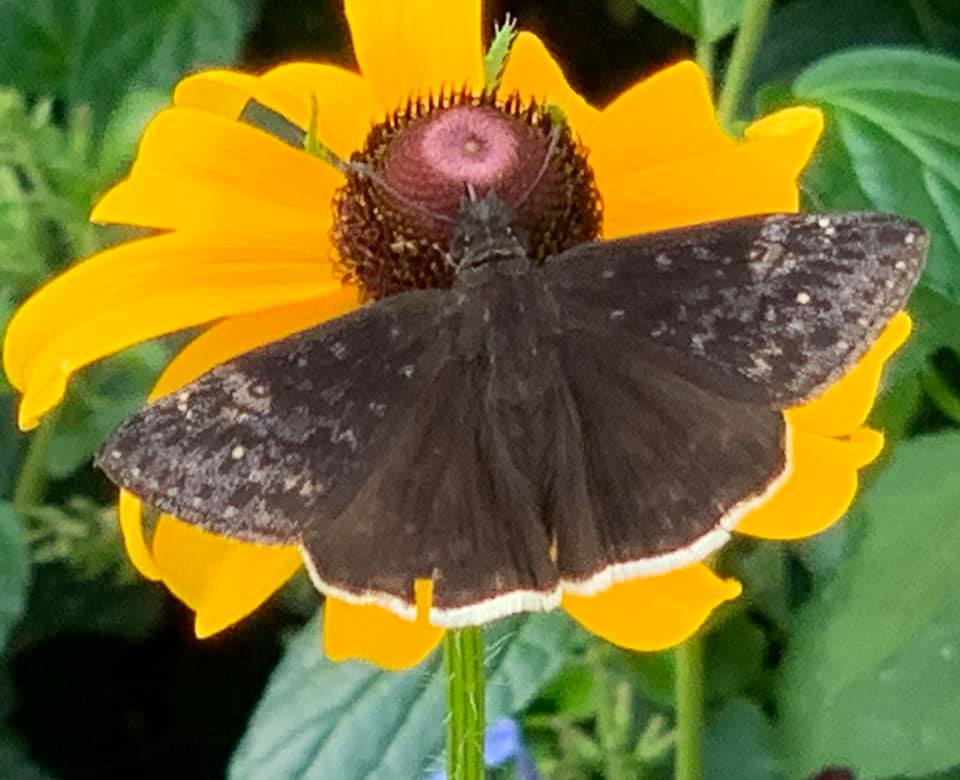
INSECTS/Hexapods: (72)
Springtails: (1)
Elongate-bodied Springtail – Salina banksi
Dragonflies: (1)
Band-winged Dragonlet – Erythrodiplax umbrata
Butterflies and Moths: (19)
Monarch – Danaus plexipus
Spicebush Swallowtail – Papilio troilus
Gulf Fritillary – Agraulis vanilla
Horace’s Duskywing – Erynnis horatius
Cloudless Sulphur – Phoebis sennae
Tawny Emperor – Asterocampa clyton
Ocola Skipper – Panoquina ocola
Dun Skipper – Euphyes vestris
Clouded Skipper – Lerema accius
Common Buckeye – Junonia coenia
Painted Lady – Vanessa cardui
Bagworm moth – Psychidae
Southern Flannel Moth – Megalopyge opercularis
Fall Webworm Moth – Hyphantria cunea
Indian Meal Moth – Plodia interpunctella
Grass Moths – family Crambidae
Yellow-collared Scapemoth – Cisseps fulvicollis
Velvetbean Caterpillar Moth – Anticarsia gemmatalis
Southern Beet Webworm – Herpetogramma bipunctalis
Flies: (10)
Secondary Screwworm Fly – Cochliomyia macellaria
Goldenrod Gall Fly – Erosta solidaginis
Long-legged Fly – Condylostylus patibulatus
Long-legged fly – Condylostylus sp.
Asian Tiger Mosquito – Aedes albopicta
Oriental Latrine Fly – Chrysomya megacephala
Leaf-miner Fly – family Agromyzidae
Hoverfly – family Syrphidae
Dusky-winged Hoverfly – Ocyptamus fuscipennis
Grass Fly – Thaumatomyia sp.
Bees, Wasps, Sawflies, Ants: (20)
Eastern Carpenter Bee – Xylocopa virginica
Southern Carpenter Bee – Xylocopa micans
Strand’s Carpenter bee – Xylocopa strandi
Western Honeybee – Apis mellifera
Carpenter Mimic Leafcutter Bee – Megachile xylocopoides
Carpenter Mimic Cuckoo Leafcutter Bee – Coelioxys dolichos
American Bumblebee – Bombus pensylvanicus
Carpenter Ant – Camponotus sp.
Black Crazy Ant – Paratrechina longicornis
Graceful Twig Ant – Pseudomyrmex gracilis
Paper wasp – Polistes dorsalis
Dark paper Wasp – Polistes fuscatus
Metric Paper Wasp – Polistes metricus
Yellow-legged Mud Duaber Wasp – Sceliphron caementarium
Four-toothed Mason Wasp – Monobia quadridens
Tarantual Hawk Wasp – Calopompilus maculipennis
Thread Wasted Sand Wasp – Ammophila sp.
Black Ichneumon Spiderhunter – subfamily Ichneumoninae
Gall Wasp – Andricus sp.
Southern Live Oak Stem Gall Wasp – Callirhytis quercusbatatoides
Beetles: (8)
Click Beetle – family Elateridae
Asian Ladybird Beetle – Harmonia axyridis
Ground Beetle – Carabidae
June Beetle – Phyllophaga sp.
Diaprepes Root Weevil – Diaprepes abbreviates
Metallic Flea Beetle – Altica sp.
Common Green June Beetle – Cotinis nitida
Swamp Milkweed Leaf Beetle – Libidomera clivicollis
True Bugs: (3)
Aphids – family Aphididae
Hackberry Petiole Gall Psyllid – Pachypsylla venusta
Scissor-grinder Cicada – Neotibicen pruinosis
Cockroaches: (4)
Suriname Roach – Pycnoscelus surinamensis
American Cockroach – Periplaneta americana
Cockroach – Blatella sp.
Smoky Brown Cockroach – Periplaneta fuliginosa
Termites: (1)
Eastern Subterranean Termite – Reticulitermes flavipes
Earwigs: (1)
Yellow-legged earwig – Euborellia arcanum
Grasshoppers, Crickets, Katydids: (1)
Great Anglewing Katydid – Microcentrum rhombifolium
Lacewings: (2)
Brown Lacewing – family Hemerobiidae
Green Lacewing – Chrysopidae
Bark Lice: (1)
Tree Cattle – Cerastipsocus venosus
SLIME MOLD: (1)
Carnival Candy Slime Mold – Arcyria denudata
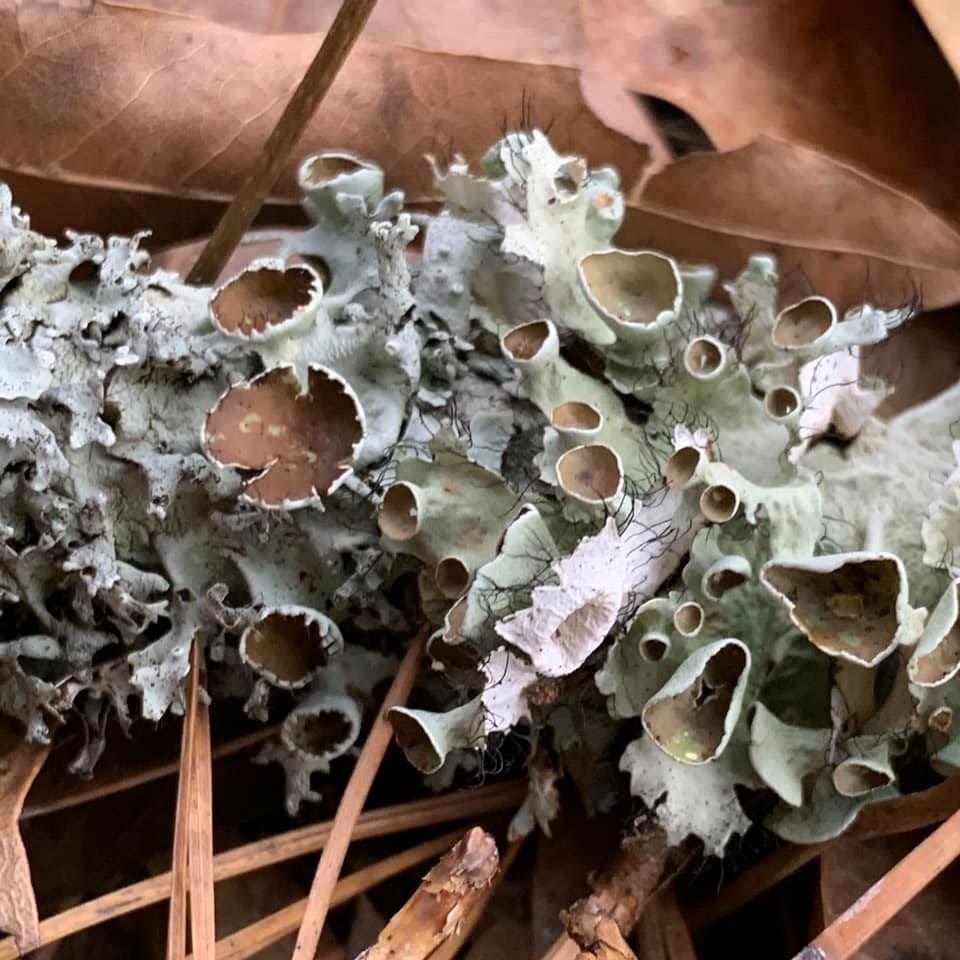
FUNGI: (36)
Hairy Hexagonia – Hexagonia hydnoides
False Turkey Tail – Stereum ostrea
Bracket Fungus – Ganoderma sessile
Bracket Fungus – Trametes lactinea
Hoof Fungus – Fomes fomentarius
Mustard Yellow Polypore – Fuscoparia gilva
Firerug Inkcap – Coprinellus domesticus
Turkey Tail Fungus – Trametes versicolor
Common Tarcrust – Diatrype stigma
Ceramic Parchment fungus – Xylobolus frustulatus
Splitgill Mushroom – Schizophyllum commune
Crowded Parchment Fungus – Stereum complicatum
Oak Bracket – Pseudoinonotus dryadeus
Honeycomb Bracket fungus – Favolus sp.
Trametes cubensis
Dyer’s Polypore – Phaeolus schweinitzii
Reddening Lepiota – Leucogaricus americanus
Bonnet Mushrooms – Mycena sp.
Pseudosperma rimosum
Trichoderma sp.
Red Russula – Russula sp.
Family Stophariaceae
Common Browncup – Phylloscypha phyllogena
Pore lichen – Pertusaria sp.
Rough-speckled Shield Lichen – Punctelia rudecta
Powdered Ruffle Lichen – Parmotrema hypotropum
Common Greenshield Lichen – Flavoparmelia caperata
Common Script Lichen – Graphis scripta
Whitewash Lichen – Phlyctis argena
Plyctis sp.
Sinewed Bushy Lichen – Ramalina americana
Viridothelium virens
Farinose Cartilage Lichen – Ramalina farinacea
Perforated Ruffle Lichen – Parmotrema perforatum
Mealy Rim Lichen – Lecanora strobilina
Hoary Rosete Lichen – Physcia aipolia
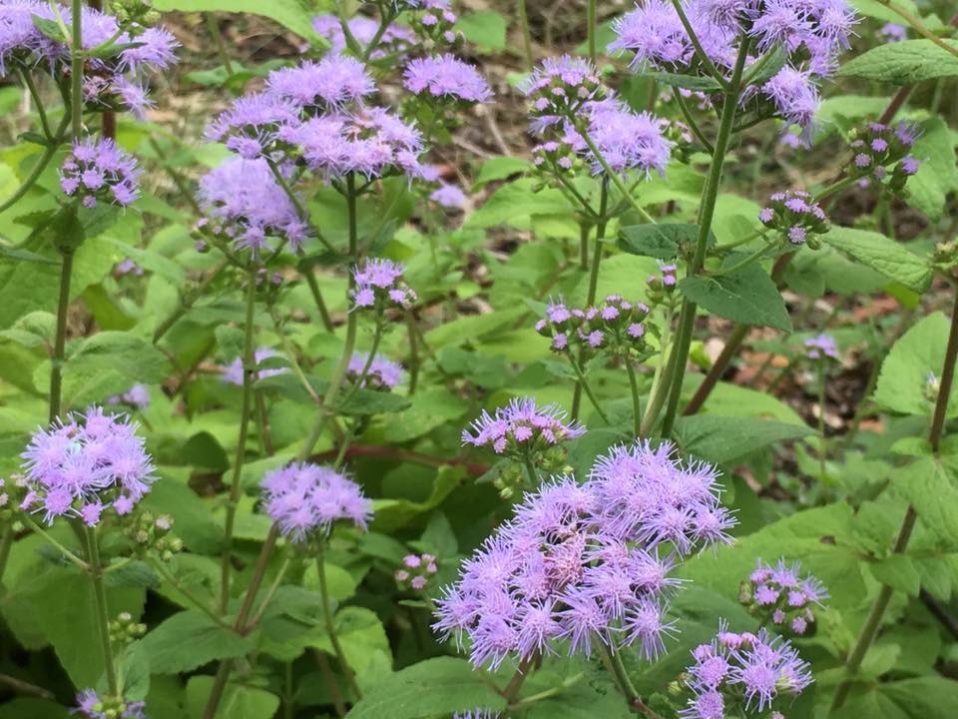
PLANTS: (164)
There are of course way more than this number of plants in Russ Pitman Park.
The Nature Discovery Center, however, already has a rather voluminous and exhaustive plant list for the park. Thus, the naturalists who participate in our Bio-blitz do not attempt to document all or even most of the plants in the park. Participants simply noted plants they found interesting, observed fruiting or blooming, or thought may not already be on the official park list of plants.
Mosses: (2)
Unidentified moss sp.
Unidentified moss #2
Ferns: (3)
Resurrection Fern – Pleopeltis michauxiana
Japanese Climbing Fern – Lygodium japonicum
Southern Wood Fern – Dryopteris ludoviciana
Palms: (2)
Dwarf Palmetto – Sabal minor
Mexican Fan Palm –
Grasses/Sedges/Rushes: (16)
Indiangrass – Sorghastrum nutans
Eastern Gamagrass – Tripsacum dactyloides
Basketgrass – Oplismenus hirtellus
Virginia Wildrye – Elymus virginicus
Switchgrass – Panicum virgatum
Wood Oats (Inland Sea Oats) – Chasmanthium latifolium
Florida Paspalum – Paspalum floridanum
Bermuda Grass – Cynodon dactylon
Marsh Bristlegrass – Setaria parviflora
Big Bluestem – Andropogon gerardi
Hairy Crabgrass – Digitaria sanguinalis
Umbrella Papyrus – Cyperus involucratus
Cherokee Sedge – Carex cherokeensis
True sedge – Carex sp.
Deep-rooted Sedge – Cyperus enterianus
Shortleaf Spike Sedge – Cyperus brevifolius
Broadleaf Plants: (141)
Mexican Plum – Prunus mexicanus
Boxelder Maple – Acer negundo
Red Maple – Acer rubrum
Black Willow – Salix nigra
Gum Bumelia – Sideroxylon langunosum
Coralberry – Symphoricarpos orbiculatus
River Birch – Betula nigra
Sweetbay Magnolia – Magnolia virginiana
False Indigo – Amorpha fruticose
Mulberry – Morus sp.
Senna sp.
Parsley Hawthorn – Crataegus marshallii
Shummard Red Oak – Quercus shumardii
Loblolly Pine – Pinus taeda
Yaupon Holly – Ilex vomitoria
American Black Elderberry – Sambucus canadensis
Southern Magnolia – Magnolia grandiflora
Sugarberry – Celtis laevigata
Green Ash – Fraxinus pennsylvanica
Southern Arrowwood – Viburnum dentatum
Southern Live Oak – Quercus virginiana
Buttonbush – Cephalanthus occidentalis
Chinese Holly – Ilex cornuta
Roughleaf Dogwood – Cornus drummondii
Eastern Redbud – Cercis canadensis
Carolina Laurelcherry – Prunus caronliniana
Loquat-leaf Oak – Quercus rysophylla
Bur Oak – Quercus macrocarpa
Bald Cypress – Taxodium distichum
Common Lantana – Lantana camara
Texas Lantana – Lantana x urticoides
American Beautyberry – Callicarpa americana
American Hornbeam – Carpinus caroliniana
Mexican Buckeye – Ungnadia speciosa
Osage Orange – Maclura pomifera
Possumhaw – Ilex decidua
Orchid Tree – Bauhinia variegata
Shining Sumac – Rhus copallinum
Pecan – Carya illinoinensis
American Elm – Ulmus americana
Groundsel Bush – Baccharis halimifolia
Southern Sugar Maple – Acer floridanum
Swamp Chestnut Oak – Quercus michauxii
American Sycamore – Platanus occidentalis
American Sweetgum – Liquidambar occidentalis
Chinese Privet – Ligustrum sinense
Ornamental Pear – Pyrus sp.
Tree Privet – Ligustrum lucidum
Willow Oak – Quercus phellos
Common Gardenia – Gardenia jasminoides
Cedar Elm – Ulmus crassifolia
Water Oak – Quercus nigra
Northern Catalpa – Catalpa speciose
Chinese Raintree – Koelrueteria elegans
American Basswood – Tilia Americana
Camphor Tree – Cinnamomum camphora
Straggler Daisy – Calyptocarpus vialis
Frogfruit – Phyla sp.
Yard Aster – Symphotrichum divaricatum
Blue Mistflower – Conoclinium coelestinum
Climbing Hempvine – Mikania scandens
Tall Goldenrod – Solidago altissima
Seaside Goldenrod – Solidago sempervirens
Giant Goldenrod – Solidago canadensis
Tievine – Ipomoea cordatotriloba
Narrowleaf Sunflower – Helianthus angustifolius
Camphorweed – Pluchea camphorata
Opposite-leaf Spotflower – Acmella repens
Spiny Chloracantha – Chloracantha spinosa
Cuban Jute – Sida rhombifolia
Chamberbitter – Phyllanthus urinaria
Leafy Elephant’s-foot – Elephantopus carolinianus
Frostweed – Verbesina virginica
Missouri Ironweed – Vernonia missurica
Mexican Primrose-willow – Ludwigia octovalvis
Three-lobed False Mallow – Malvastrum coromandelianum
Three-seeded Mercury – Acalypha sp.
Lizard’s Tail – Saururus cernuus
Buttonweed – Diodia virginiana
Obedient Plant – Physostegia virginiana
Mustang Grape – Vitis mustangensis
Muscadine Grape – Vitis rotundifolia
Brazos Pensemon – Penstemon tenuis
American Trumpetvine – Campsis radicans
Carolina Snailseed – Cocculus carolinus
Catclaw Vine – Dolichandra unguis-cati
Hairy Crabweed – Fatoua villosa
Pickerelweed – Pontederia cordata
Rattlesnake Master – Eryngium yuccifolium
Cast Iron Plant – Aspidistra elatior
Monkey grass – Lirope sp.
Shrimp Plant – Justicia brandegeeana
Mexican Ruellia – Ruellia simplex
Heavenly Bamboo – Nandina domestica
Wedelia – Sphagneticola calendulacea
Turk’s Cap – Malvaviscus arboreus
Whitemouth Dayflower – Commelina erecta
Wild Petunia – Ruellia caerula
Poison Ivy – Toxicodendron redicans
Scarlet Sage – Salvia coccinea
Virginia Creeper – Parthenocissus quinquefolia
Ball Moss – Tillandsia recurvata
Japanese Honeysuckle – Lonicera japonica
Late Boneset – Eupatorium serotinum
Saw green Briar – Smilax bona-nox
Cross Vine – Bignonia capreolata
Eastern False Aloe – Manfreda virginica
Western Ragweed – Ambrosia psilostachya
Maximillian Sunflower – Helianthus maximiliani
Tickseed Beggar’s Ticks – Bidens aristosa
Downy Lobelia – Lobelia puberula
Pepper Vine – Ampelopsis arborea
Giant Ragweed – Ambrosia trifida
Scarlet Creeper – Ipomoea hederifolia
Crow Poison – Nothoscordum bivalve
White Clover – Trifolium repens
Bladder Pod – Sesbania vesicaria
Alligatorweed – Alternathera philoxeroides
Swamp Criunum – Crinum sp.
False Daisy – Eclipta prostrata
Carolina Crane’s-bill – Geranium carolinianum
Spotted Spurge – Euphorbia maculata
Graceful Spurge – Euphorbia hypericifolia
Painted Spurge – Euphorbia heterophylla
Wisteria – Wisteria sp.
Oriental False Hawk’sbeard – Youngia japonica
Sensitive Plants – Mimosa strigillosa.
American Hog Peanut – Amphicarpaea bracteata
Greater Plantain – Plantago major
Broad-leaved Dock – Rumex obtusifolius
Mock Strawberry – Potentilla indica
Carolina Ponysfoot – Dichondra carolinensis
Southern Dewberry – Rubus trivialis
Pennsylvania Blackberry – Rubus pensilvanicus
Largeleaf Pennywort – Hydrocotyle bonariensis
Goosefoot Plant – Syngonium podophyllum
Black Snakeroot – Sanicula canidensis
Peruvian Lily – Alstroemeria aurea
Tahitian Bridalveil – Gibasis pellucida
Blue Violet – Viola sororia
Shrubby Boneset – Ageratina havanensis


